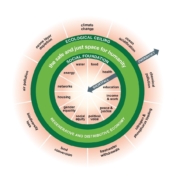Presenting the Economic Policy of the Occupy Movement
by Brian Czech
 If there is one thing the Occupy Wall Street movement has generated, it’s the opinion that there is no unifying agenda or policy being advanced by the Occupiers. Perhaps that explains why we (CASSE) have been asked repeatedly to contribute to that agenda and identify that policy. And perhaps the time has come to oblige.
If there is one thing the Occupy Wall Street movement has generated, it’s the opinion that there is no unifying agenda or policy being advanced by the Occupiers. Perhaps that explains why we (CASSE) have been asked repeatedly to contribute to that agenda and identify that policy. And perhaps the time has come to oblige.
No one can claim to represent the entire Occupy movement or all its concerns. The wide-ranging movement has taken on local, grassroots issues as much as national, systemic concerns. I got a taste of that recently during a visit to Bloomington, Indiana, where the local Occupiers were camped out on the perimeter of Indiana University. I was in Bloomington to give a talk about steady state economics at the university, and happened upon the Occupiers’ camp my first night in. They had little to say about Wall Street, GDP, or national unemployment. Maybe it was just my timing — which happened to correspond with Halloween– but the Bloomington Occupiers seemed pre-occupied with surviving the annual student “Zombies” march that apparently threatens the security of Indiana University every Halloween. The Occupiers were equally concerned with aggressive Zombies and the police assembled to confront said Zombies. (They feared the police would use the Zombies as an excuse to clean house all around the campus.)
It’s hard to blame the Occupiers for focusing on local issues and forces. Police suppression alone saps the energy from many movements, as I recall from the days of World Bank demonstrations. Yet despite the inevitable localization of Occupier concerns, the Occupy movement needs a national identity to survive, and it needs a macroeconomic policy goal to unite around. That policy goal should be a sustainable and fair steady state economy. Let’s see why.
The Occupy movement is, first and foremost, an objection to the rule of Big Money; big corporations, big banks, and big-time rip-offs of the taxpaying public. It’s all about economic justice. But at this point in history, economic justice is complicated by limits to economic growth. The old notion that a “rising tide lifts all boats” has become morally inadequate and physically irrelevant. In a world of over 7 billion people and an economy over $73 trillion in gross world product, the Wall Street Bull is tromping through an ecological china shop with increasingly endangered glassware. It’s not only that the Wall Street Bull is kicking Occupiers and the rest of the 99% out of the way; the Bull is destroying the planet. It spans the globe but the globe is full.
The Occupiers need to get this, discuss it, and emphasize it. Otherwise, they could be unfairly portrayed as just the latest brand of populists seeking to expropriate the expropriators. Wall Street could point out that everybody has always wanted “theirs,” including Nazis, Bolsheviks, and French revolutionaries known today as “The Terror.”
The Occupiers can do better. They are better.
The Occupy movement can do better especially by adopting the steady state economy as its macroeconomic policy goal. That means an economy with stabilized levels of production and consumption, which means stabilizing population and per-person consumption. It means an economy that fits on Earth without threatening present and future generations with its overbearing, bloating size. It means an economy of stable size that, when accepted by national governments and sought in international diplomacy, replaces war as a mode of getting “theirs.”
Only sound economic diplomacy — steady statesmanship — can ensure that everyone gets enough without killing thy neighbor. Wall Street doesn’t get that. To the corporations and banks, the world is a china shop to buck around in, and good luck to the kicked.
The ball is in the Occupiers court. They’ve got to concern themselves with more than the local food, zombies, and police. Occupiers must decide if they really want to distinguish themselves from the growth-at-all-costs corporations, banks, Democrats and Republicans that really and permanently occupy Wall Street. Can they distinguish themselves with steady statesmanship?
I think they can, and I’m one of them!







I agree. I hope that the Occupy movement can be a good voice for change, towards the kind of just and environmentally sustainable economy that CASSE aims to achieve.
I have been familiar with the steady state economy premises but the methodology has been lacking. How does a steady state assess the necessary rationing of resources that serves the social requirements but retains competitive motivations (ground up resolutions)?
At the same time how does the out of control mechanism of capture fiance get restructured to relinquish command over the currency that ultimately determines the constellation of parameters of an economy from labor to strategic administration and commercial exchanges?
Ultimately this is not going to come from a populous educated policy demand, but from an entire shift in priorities that would entail an entrenched and nested hierarchy of real people dominating demographics over generations. The power element is a wild card.
Short of systemic shifts and systematic epicenters that will somehow reverse sprawl, can we begin a discussion on realistic methodologies and grounded demands? If the academic authorities have failed to authenticate a preferable life sustaining systemic for sustaining the ecological integrity of the planet under a drive train of economic realism,…how can you say the ball is in the Occupiers court. The truth is that most people in the street simply want a fair chance to get a piece of the pie; not to find new ways to make it more holistically emergent. The truth of the matter is that Economics does not get off the hook so easily, and the ball is still in your court to show how and why the bubble heads have convinced the world that we must finance transaction therapy at all costs and triangulate the differences to hide the damages. the truth is that economic authorities are going to have to follow through with the research and show full spectrum analysis; follow the money , name names and point fingers…so the Occupiers will know where to put their tents! Sorry if that sound cynical…but we don’t have time for smiles in an era of ill will.
There is a decent conversation about this going on at the online #occupy General Assembly at http://www.openassembly.org/index.html#item/_t95017/_o438135 There is a fair degree of interest there!
Pulitzer Prize-winning author Chris Hedges said (in a CBC interview) re Occupy Wall Street:
“They want to reverse the corporate coup that’s taken place in the United States and rendered the citizenry impudent, and they won’t stop until that happens. And frankly, if we don’t break the back of corporations, we’re all finished anyway, since they’re rapidly trashing the ecosystem on which the human species depends for survival. This is literally a fight for life. It’s that grave, it’s that serious. Corporations, unfettered capitalism, as Karl Marx understood, is a revolutionary force. It commodifies everything – human beings, the natural world – which it exploits for profit until exhaustion or collapse.”
http://rabble.ca/rabbletv/program-guide/2011/10/best-net/cbcs-kevin-oleary-gets-schooled-occupy-movement-chris-hedges
Although I got my master´s, especially to understand the finer points of my own involvement with activism and functional alternatives, those existing alternatives form the stronger bulwark for the Occupiers than theory, I think. Theory, including prominently steady state eco economics, is a strong basis to underlie the practical efforts.
Within the solidarity economics movement, many activists are familiar with a variety of enterprising efforts, such as Green Worker Coops in the South Bronx, or Evergreen Laundry in Cleveland. Rarely have I met anyone who knows about Greenpeace´s role in developing a major ozone-safe refrigerant “Greenfreeze.” Many people certainly have heard of organic food certification and Fair Trade, with books by Jared Diamond, Collapse, and Michael Conroy, Branded, offering strong research and overviews.
Steady State ideas are good for the theoretical underpinnings, but since John Muir´s efforts and the food coops of the hippie 1970s, practical efforts have been essential.